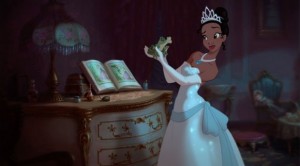 I haven’t seen Walt Disney’s The Princess and the Frog movie yet, but living in a neighborhood with young families many of them have, and they seem to have enjoyed it. The television advertisements for the film make me a little wary since it is supposedly the best Disney cartoon since The Lion King. But come on, what about The Emperor’s New Groove?
I haven’t seen Walt Disney’s The Princess and the Frog movie yet, but living in a neighborhood with young families many of them have, and they seem to have enjoyed it. The television advertisements for the film make me a little wary since it is supposedly the best Disney cartoon since The Lion King. But come on, what about The Emperor’s New Groove?
Two articles in Religion Dispatches give me reason for pause in seeing the film, or at least to watching it more critically if I do decide to see it. The first is an article by Anthea Butler titled “Disney’s Lump of Coal.” The author’s displeasure with the film may be summarized with the words, “I’m going to go all out and say that the entire movie is a wholesale desecration of New Orleans, Creole culture, Cajun Culture, religion, zydeco music, the Evangeline story, and Louis Armstrong..”. In the second article, Michelle Gonzalez Maldonado focuses her displeasure with the film specifically on its treatment of Haitian religion in a piece titled “Bad Magic: Voodoo According to Disney.” Maldonado feels that “this film perpetuates offensive stereotypes about Voodoo.” As the author concludes the analysis she writes:
I did not expect critical race analysis or a sophisticated presentation of Voodoo when I walked into the theater. It is, after all, Disney. I did not expect such a blatant, racist, and misinformed presentation of Voodoo, however. The reduction of religion to magic is also reaffirmed in the curious absence of Catholicism in the film. My son is correct, Disney Voodoo is bad magic; it just doesn’t have anything to do with the authentic African Diaspora religion.
But how should audiences react to elements of race, culture, and religion as portrayed in a fantasy cartoon? Even Butler writes, “Yes, I know, it’s just fantasy, right?”
On the one hand, elements within a fantasy film take on the meaning given them by the writer of the story. This is a basic principle of literary, and by extension, cinematic interpretation. So it would be inappropriate to critique Harry Potter for providing “inaccurate” portrayals of witchcraft, since J. K. Rowling was creating a contemporary fairytale form of witchcraft rather than a representation of Wicca outside of her fantasy context.
But on the other hand, it would be a mistake to give fantasy a pass in terms of being divorced from the social and cultural context in which it is produced. Josha Bellin, author of Framing Monsters: Fantasy Film and Social Alienation (Southern Illinois University Press, 2005), reminds us that in addition to entertainment and escapism, fantasy has a dark side that is often missed because it is held to be separate from reality:
But of course, that’s what makes these films particularly powerful vehicles of social alienation, the phrase I use to suggest the whole range of processes by which marginalized groups are stereotyped, victimized, and scapegoated: fantasy films’ resistance to critical scrutiny enables them to perpetuate loathsome social ideologies under the guise of “harmless entertainment.”
My previous interview with Bellin on this topic as the thesis of his book can be found here, along with a second interview contrasting the original King Kong with Peter Jackson’s more recent version. Both interviews shed light on the need for a more critical reading of fantasy films that will enable viewers to gain a deeper appreciation of the many facets of fantasy and how they reflect social and cultural contexts. I offer this as food for thought for those who want to probe Disney’s latest cartoon offering beyond holiday cinema escapism.





Thanks for this keenly insightful look at the Princess and the Frog. I too have felt wary of this fim based on the trailers, and its representation of black culture and this article just pushed me over the edge. I’ll probably catch it at the dollar theater, unil then I applaud your determination to hold fantasy films accountable for their representation of real life people and culture.